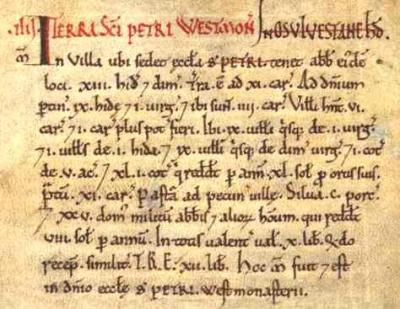英语听力万花筒 19 Domesday

In March, I recorded a podcast about the census in this country – that is, the counting of everyone who lives here. Today’s podcast is also about a census – the very first census to take place England.
In the year 1066, William, Duke of Normandy, defeated King Harold at the Battle of Hastings, and became King of England. It was one of the most important events in English history. It completely changed the way of government in England, and it had a big effect on the English language.
After a number of years as king, William became dissatisfied. He felt that he did not know enough about his new kingdom. Like all kings and governments, he was hungry for information. He did not know exactly how much land his nobles owned – indeed, he did not really know how much land he himself owned. More important, he could not work out how much tax his subjects should pay, or how many men could be made to become soldiers in time of war.
In 1085, he decided to find the answers to these questions. He sent trusted officials to every part of the country, to ask who owned which land, and how much they owned; how many ploughs they had to cultivate the land, and how many animals such as cows and sheep there were; how many serfs (unfree men) they had, and how many slaves; and how many corn mills and fisheries there were.
Compare this list of questions with the questions in the 2011 census, which I talked about in my earlier podcast. They are in many ways very similar questions. In 1086, King William wanted to know how many sheep I had. In 2011, the government wants to know how many bedrooms I have in my house and whether it has central heating.
King William’s census was completed the following year. It covered most, but not all of England. A scribe then carefully copied the details of the census for each place in England onto parchment made out of sheep skin, and made them into a book (well, two books actually). For hundreds of years, the books were important legal documents. If there was a dispute about land ownership, for example, or about how much tax should be paid, the court would look at what the census said. It was impossible to argue with the book. For that reason, it became known as the Domesday Book. “Domesday” means the Judgement Day, when in traditional Christian thinking we shall all be judged on the lives we have led, and there will be no arguing with the court on Judgement Day!
The Domesday Book is one of the most remarkable documents in Europe. Nowhere else has such a detailed early record of land ownership. The Domesday Book is in the National Archives in Kew, near London, but it is now too fragile to display. However, all of the information in it is available online, and you can buy copies of any of the pages which you are particularly interested in. (However, unless you know Latin you will be unable to understand it!)
Let us now jump forward about 900 years, to the mid-1980s. The BBC was at that time very interested in the development of computing and in what we nowadays call “multi-media” technology. (“Multi-media” technology means, roughly, using computers to store and manipulate pictures, videos, text, music etc). The BBC, for example, made and sold their own computer, and for many families in Britain, the very first computer they had in their homes was a BBC computer.
The BBC decided to launch a new Domesday project. It asked schools and community groups all over Britain to write short articles and take photographs about everyday life in Britain, particularly about things which would be interesting to people 1,000 years from now. It divided the whole country into blocks, 3km by 4km, and it linked the articles and photographs to these blocks, so that it would be possible to find information about every place in Britain. Over a million people took part, in one way or another. Altogether, they sent the BBC more than 140,000 pages of text and 23, 000 photographs.
And then the BBC made a great mistake. King William had a scribe to write his Domesday book onto parchment with a pen and ink, and we can still read what he wrote hundreds of years later. The BBC put the information about the new Domesday project onto things called “laser discs”. Have you ever heard of laser discs? No, I haven’t either. Within a few years, technology had moved on, and no-one had a computer which could read laser discs.
Happily, however, the BBC has recently completed the task of transferring everything in its Domesday survey onto a website. You can find little articles and photographs about almost everywhere in Britain in the mid-1980s. And now the BBC have invited us to send in new photographs and articles for the website so that we can see what has changed in the last 25 years.




















